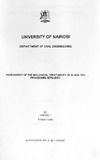| dc.description.abstract | The anaerobic degradability of black tea beverage processing effluent was assessed using a stationary upflow anaerobic filter. The filter, with an active column of 1.2m height, inner diameter of 100 mm and filled with rock as the attachment medium was operated at room temperature ranging between 20-25°C throughout the study period. The inoculum used (Anaerobic sewage sludge) took over three months to start digesting the factory effluent. This was attributed to lack of acclimation.
After start-up the filter was operated on a batch basis for 105 days at a Hydraulic Retention Time (HRT) of 7 days using the factory effluent as the substrate. Immediately after introduction of the substrate (Factory effluent), the system was in a shock for 28 days. However, it recovered from the shock from day 29 and by day 105 a COD removal efficiency of 74% had been achieved.
From day 106 and for the next 56 days the filter was operated on a continuous basis at a HRT of 36 hours and an Organic Loading Rate (OLR) of 0.67kg COD/m3 day. This operation certainly enjoyed some good acclimation of the anaerobes already created by the batch process and by the end of the 56 days a COD removal efficiency of about 90% had been achieved. Suspended solids were 100% transformed in this operation. | en_US |

